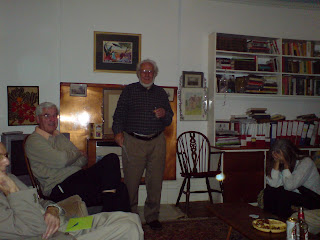Wednesday, December 20, 2006
A toast to Keir Hardie - the West Branch Christmas party

Last Wednesday an enjoyable Chistmas party was hosted by Leslie Turner at his home. The evening included a toast to Keir Hardie, as Leslie has a picture of him taken from the original Labour Party building in Maidstone that is now sadly no longer present.
I have edited the history below given the comment from a blogger about Keir Hardie.
James Keir Hardie was born in Lanarkshire, Scotland on 15 August 1856, the illegitimate son of a servant, Mary Keir. His mother later married David Hardie, a carpenter. Keir Hardie was sent to work as a baker's delivery boy aged eight without any schooling, and was the sole wage-earner of the family. By the age of 11, he was a coal miner. By 17 he had taught himself to read and write.
His career in politics began with the establishment of a worker's union at his colliery, and in 1881 he led the first ever strike of Lanarkshire miners. In 1892, Keir Hardie was invited to stand as the Independent Labour Party candidate for West Ham in east London. He won and took his seat in parliament. He marked himself out as a radical both by his dress - he wore a tweed suit when most MPs wore more formal dress - and the subjects he advocated, including women's rights, free schooling and pensions and Indian self-rule. He was heavily criticised for appearing to attack the monarchy, which may have contributed to his defeat in the 1895 election.
Despite this, he continued to rise through the ranks of Scottish union officials and in 1893 he was among the group who formed the Independent Labour Party. At the opening conference, he was elected chairman and leader. 1899 saw the formation of the Labour Representation Committee, which eventually developed into the Labour Party.
After a long battle to win another seat, he was finally elected MP to Merthyr Tydfil in 1900 and was one of only two Labour MPs in Parliament. But by 1906 this number had increased to 26. Keir Hardie was elected leader of the party in the House of Commons, but was not very good at dealing with internal rivalries and he resigned from the post in 1908. From then on he devoted his energy to promoting the Labour Party and championing equality, particularly in the cause of women's suffrage. In 1910, 40 Labour MPs were elected to parliament and Keir Hardie gave up the party leadership to George Barnes.
During the first year of World War One, Keir Hardie was an outspoken pacifist. He died on 26 September 1915 in Glasgow.
Comments:
<< Home
I am from Merthyr Tydfil and I'm sure that Keir Hardie was a Member for the I.L.P. and that they fought for years against the Labour Party.
May I comment upon the blog from 'tyelise' to say it is correct that Keir Hardie was an ILP MP
for Merthyr from 1900; he had previously been a Liberal MP and represented West Ham from 1892-5. It was not until the 1930s that the ILP left the Labour Party to which it had been affiliated, and Hardie had died in 1915 - the ILP had been what Atlee described as "The Inspiring force of the movement" - the Labour Party of that time was a federal organisation of TUs and socialist societies and it was the ILP decision to go against the majority decisions which led them to secede and thereafter go their own way to oblivion. Leslie Turner
for Merthyr from 1900; he had previously been a Liberal MP and represented West Ham from 1892-5. It was not until the 1930s that the ILP left the Labour Party to which it had been affiliated, and Hardie had died in 1915 - the ILP had been what Atlee described as "The Inspiring force of the movement" - the Labour Party of that time was a federal organisation of TUs and socialist societies and it was the ILP decision to go against the majority decisions which led them to secede and thereafter go their own way to oblivion. Leslie Turner
<< Home


Post a Comment